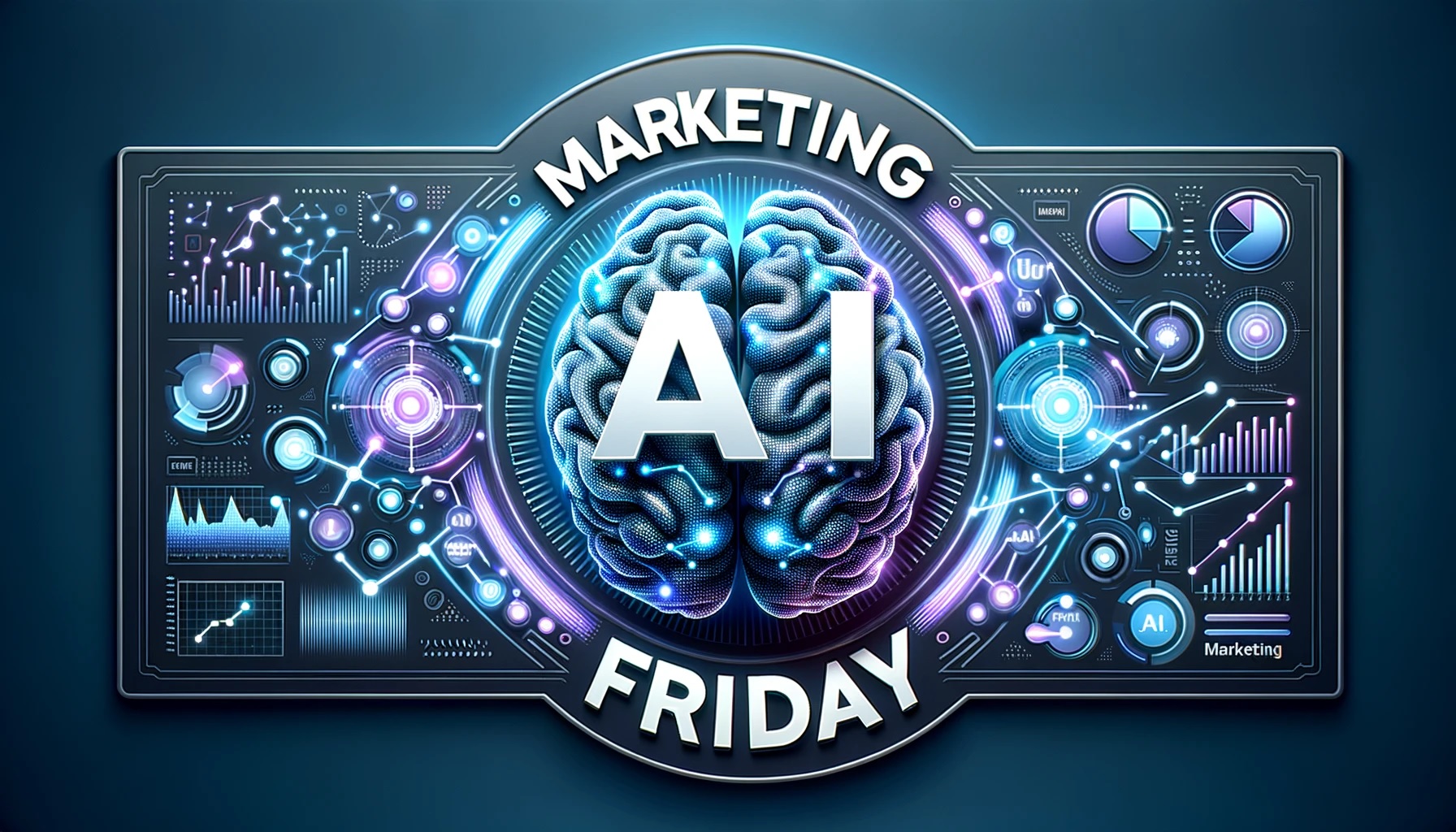For what aspects of content marketing can you apply AI?
Have you used AI in your marketing efforts in the past year? By 2024, we are going to see an acceleration in the capabilities of AI, with an ever-increasing impact on all facets of marketing, including content creation, distribution, promotion and strategy development.
As marketers, we will have access to advanced AI tools to create countless forms of content, distribute it in the most personal and relevant way possible, as well as be supported by AI assistants to do this as efficiently and effectively as possible.
I am convinced that by the end of next year our way of working will be radically different than it is today - and this applies to the entire marketing landscape.
Let's take a closer look at the specific marketing aspects where AI can play a role and explore the potential risks.

Content creation
For many marketers, content creation is the first area they use AI for. They use AI to create content (more effectively) such as text, images, audio and video:
- Text: Generate, summarize and translate as well as answer emails, and respond to social media posts.
- Images: Creating and editing visual material.
- Audio: Enhance and edit sound recordings.
- Video: Edit and modify video content, such as removing or replacing specific parts.
- Audio to text: Convert audio to text for transcriptions of podcasts, for example.
- Text to visuals/videos: Create visual content or videos from written text.
- Images to videos: Converting images into dynamic video content.
- Text to AI-generated audio: Convert written text to AI-generated audio, even with your own personalized AI voice.
See below an example from my colleague Denis Doeland, this video was created with only written text as input.
However, with the rise of AI-generated content, it is becoming increasingly difficult to distinguish between "real" content, created by humans such as copywriters or designers, and content created with or by AI. This could strain trust in online content, with implications for Google search results, for example, where we are already seeing an increase in AI-generated articles and even images.
If, as expected, AI is also going to be widely used for responses under social media posts, reviews of products and answering emails, trust will decline in those as well. It is therefore crucial for marketers to be transparent about the use of AI and develop strategies for maintaining authenticity and trust in an era when AI content is becoming more common and accepted.
Content distribution
AI can also be used for content distribution to increase visibility and effectiveness on channels such as social media, websites and email marketing. The possibilities are diverse:
- Content planning: AI can help create a sophisticated content calendar by analyzing data and trends to determine optimal publication times.
- SEO Optimization: As search engines continue to change, AI can be used to optimize content for both current search engine algorithms and AI-driven tools in which you also want to become visible.
- Email marketing: AI helps determine the best send times, optimizes subject lines and creates personalized content for different user segments.
- Personalized content: On websites and in-apps, AI can be used to make personalized product or content recommendations tailored to the individual user's behavior and preferences.
The use of AI in content distribution enables marketers to not only distribute their content more effectively, but also gain deeper insights into the preferences and behavior of their audience, leading to a more aligned and successful marketing strategy.
Online advertising
The use of AI can make online campaigns more efficient and effective. It can analyze large amounts of data and learn from user interactions allowing it to be used for:
- Targeting: AI helps identify the most appropriate audience for a campaign using advanced data analysis.
- Ad creation and variation: Choosing the most effective ad executions and creating several variations to maximize response pricing.
- Personalization: Customize ads to individual users for a more personalized approach.
- Advertising Space Optimization: Efficient procurement of ad space by predicting the most effective placement and timing.
- Testing and Optimization: Continually test and adjust campaigns for maximum impact and results.
By using AI, you can not only refine your social advertising strategy, but also make real-time adjustments based on detailed insights, leading to higher engagement and better ROI.
Customer Service
AI is also a powerful tool for improving customer service, making processes more efficient and effective. A common application is the chatbot through websites, chat rooms, instant messaging apps and social media.
Here are some concrete ways AI is improving customer service:
- Providing information: Chatbots can assist customers in finding specific information on the Web site, such as details about products, services, employees or the company itself.
- Problem solving: They are able to help customers solve simple problems with products or services, or provide usage instructions.
- Feedback and experience: Chatbots can actively gather feedback from customers about their experiences with the company, providing valuable insights for continuous improvement.
So the use of AI in customer service goes beyond automation; it is about creating a more personalized, interactive and effective customer experience.
Content strategy
By 2024, AI will play a crucial role in developing content strategy. Through advanced data analysis and trend identification, AI enables marketers to gain deeper insights into what really moves their audiences. This goes far beyond traditional methods and includes:
- Fan journey analysis: Understanding how the audience's fan journey unfolds and what moments are crucial.
- Search Terms Research: Identify search terms relevant to the audience, which helps create SEO-optimized content.
- Touchpoints optimization: Recognize key interaction points and optimize them for better customer experience.
- Topic Selection: Determine topics that appeal to audiences based on their preferences and behaviors.
- Story selection: Determine which stories best fit the fan journey.
- Content concepts and formats: Analyze which content concepts and formats - such as video, blogs, infographics - are most effective.
- Distribution Choice: Identify the most effective channels to reach audiences, from social media to email marketing to in-house GPTs.
Data and insight
AI can process large amounts of data to identify trends, consumer behavior and market developments. These analyses contribute to data-driven decision-making and help hone content marketing strategies. AI's capabilities include:
- Predicting customer behavior: Using historical data to predict future customer behavior, which helps anticipate changing needs.
- Effectiveness Measurement: Measuring the impact of content marketing, from user engagement to conversion.
- Results improvement: AI algorithms continuously analyze the performance of different content forms and channels to increase effectiveness.
- Strategic adjustments: Based on the insights gathered, AI can help refine the content marketing strategy to better suit the audience.
This overview is just a starting point; the possibilities of AI in marketing are almost endless. As is becoming clear, AI can play a revolutionary role in virtually every aspect of marketing.
Want to implement AI in your marketing efforts and across your organization?
Here are some essential steps to consider in 2024:
- Establish an AI steering committee: Create a team with representatives from each department. These "discoverers" will take the lead in developing and implementing AI strategies in your organization.
- Develop an AI policy: Establish both internal and external AI guidelines. Check out our template AI policy for inspiration.
- Invest in AI training: Make sure your team has the necessary knowledge and skills to work with AI.
- Map work processes: Identify where AI can have the greatest impact and how to deploy it effectively.
- Experiment with AI: Test different AI tools to see what works best for you. Consider an "AI Friday" to try out new applications.
Remember: with any major change, and especially something with an impact like AI, success depends on your team's willingness to adapt and take responsibility. It can be valuable to explore the different stages an organization goes through when adopting AI.
With the right preparation and mindset, AI can be a gamechanger in your marketing strategy, making your business more efficient, effective and data-driven.
Take a leap forward in your marketing AI transformation every week
Every Friday, we bring you the latest insights, news and real-world examples on the impact of AI in the marketing world. Whether you want to improve your marketing efficiency, increase customer engagement, sharpen your marketing strategy or digitally transform your business, "Marketing AI Friday" is your weekly guide.
Sign up for Marketing AI Friday for free.









